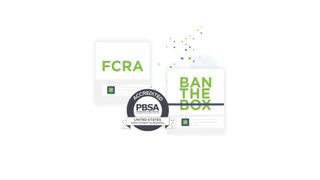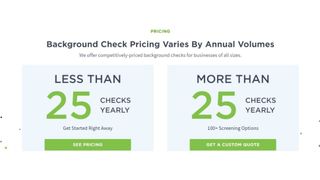What is a background check?
What is a background check? We answer and analyze how checks help individuals and businesses verify key information, from age and address to criminal records

What is a background check?
A background check is a quick, cost-effective way to verify someone’s identity, with reports usually covering address history, contact details, family members, and criminal records. The best people search sites achieve this for consumers by accessing public records and providing instant results, while business-aimed solutions provide more thorough reporting, and may include manual checks by staff.
What does a background check do?

If you’re about to make an offer to an employee or offer a lease to a tenant, a background check helps you to:
- Verify someone’s name, location history, social security number, employment, and education
- Make sure you’re aware of their criminal and motor vehicle records
- Check their credit history and other financial liabilities that could impact your business
If you’re using background checks for personal decision-making, you can:
- Search for someone’s records using their name, phone number, address, or other identifiers
- Find basic information including property ownership, contact details, and even social media profiles
- Pay a premium fee to have an overview of their criminal records, financial solvency, and personal and business associates
How stakeholders can use a background check

Employers
Employers can use background checks to screen candidates before making employment offers. By verifying information, including previous jobs, educational background, social security number, and location history, hiring managers ensure that each new employee is fully qualified.
Where relevant, background checks can also help meet legal requirements, either at company or state level, by ascertaining criminal convictions, traffic violations, or credit history.
When using background checks to make employment decisions, it’s legally required that employers use providers that comply with the Fair Credit Reporting Act (FCRA)—such as GoodHire—to ensure that reporting is accurate and respects candidates’ rights.
Landlords and realtors
Background checks allow property managers to efficiently screen prospective tenants. You can find out, for instance, whether the person has good credit history—which could indicate the likelihood of paying rent consistently.
Get the ITPro. daily newsletter
Receive our latest news, industry updates, featured resources and more. Sign up today to receive our FREE report on AI cyber crime & security - newly updated for 2024.
Trust is a crucial element in real estate relationships, so landlords may want to validate information including a prospective tenant’s name, age, past addresses, and employment. The same benefits apply to a realtor verifying the credentials of a prospective property buyer or seller.
Similar to employment offers, tenancy-related decisions can only be made using FCRA-compliant tools, such as Whitepages Tenant Screening.
Consumers
Individuals can use people search websites, such as TruthFinder, to verify the identity of someone entering their family or close circle, or as a way to find out someone’s location or identify from information such as a phone number. People search sites for personal use don’t necessarily have to be FCRA-compliant.
For instance, organizing a playdate with the new neighbors, finding the phone owner of a missed call, or meeting up with a dating app prospect are all legitimate reasons an individual might want to verify someone’s background.
Getting results based on a name, phone number, or address search is usually quick and straightforward, potentially saving you hours relative to manual research on Google, social media, or public record inquiries.
Features and benefits of a background check
Personal information
The personal information section of a background check includes the person’s name, current and previous addresses, employment and educational history, email, phone number, and, in some cases, social media profiles such as Facebook or LinkedIn. This feature can help verify someone’s identity, and fact-check information given to you by the individual.
Family and relationships
A person's associates, including family members, partners, housemates, and business connections, can also be included in a background check, usually accompanied by their respective ages and locations. Some websites offer to run additional background checks for associates, which can be useful, for instance, if you’ve got reservations about someone’s business or romantic partner.
Criminal record and motor vehicle records check
The criminal record check has varying degrees of detail, depending on the provider, but it generally includes the type of charge, its date, and other related details. Depending on the federal and state law that applies to your business, the check may only include data from a specific number of states, going back a limited number of years. The Motor Vehicle Records (MVR) check, which can include traffic violations like running a red light as well as information such as vehicle ownership, is sometimes offered alongside the criminal record check.
Asset ownership
Background checks can also include assets owned by the individual, such as land, houses, or commercial properties. Asset details include addresses, buying price, current property value, other registered residents, and local demographic statistics. This information can be valuable if you’re a realtor assessing a buyer or seller, or if you’re moving into a new property and are interested in the owner’s background.
Financial solvency
Credit checks, bankruptcies, and debt levels can be included in a background check, usually as a premium add-on feature. This section can indicate financial difficulties at a personal or business level, and where the debt or insolvency originates. Understanding someone’s ability to manage money could benefit you if you’re thinking of entering a business partnership or a romantic relationship with someone, or if you’re an employer hiring someone in a financial management role.
How much does a background check cost?

Background checks provided for employment or tenancy decisions are usually priced differently from those intended for consumer use. The former may be priced according to the annual volume of checks required, so larger enterprises may see a lower cost per check.
Businesses are also able to control costs by selecting individually priced components, whereas consumers have less flexibility over report contents.
For an employee background check, GoodHire charges $54.99 per Standard report if you need less than 25 checks a year, and has custom pricing if you require over 25 yearly checks. Landlords and realtors can order a background check and credit report for $38 per report from RentPrep, with optional add-ons, such as a $10 income verification section per report. Other vendors, including First Advantage, require customers to get in touch for a quote.
Background checks for consumer use tend to be cheaper, as they don’t have to be FCRA-compliant, and don’t usually include manual verification. These often have a monthly subscription cost, which includes unlimited people searches, and price add-ons separately for advanced results.
For example, Intelius charges $29.63 a month, billed monthly, and an additional $7.59 per report for premium data including criminal records and bankruptcies. Some vendors, however, do charge on a per-report basis—for instance, a background check from PeopleFinders costs $1.95 flat.
Background check FAQs
What do they look at in a background check?
A typical background check for consumer use includes personal information such as name, age, and address, followed by employment and education history, family relationships, contact details, and an overview of traffic violations and criminal records. Some solutions may also include links to the person’s social media and even online dating profiles.
Additionally, solutions aimed at employers and landlords may offer extensive employment or tenancy data—the names of previous landlords, for instance—as well as any credit history irregularities or criminal offenses as defined by the FCRA.
Where can I get a full background check?
If you’re using a background check to make an employment or tenancy-related decision, then you must use a solution that’s compliant with the FCRA. Such providers include GoodHire, Sterling, and HireRight for employers, and VeriFirst, My Smart Move, and RentPrep for landlords and realtors.
For most personal matters, you can get a background check with people search websites, such as PeopleFinders, BeenVerified, and Intelius. Though these aren’t always FCRA-compliant, they offer a reliable public records summary of someone’s location, associates, and contact details.
What is the best website for background checks?

While it depends on your individual requirements, we believe that PeopleFinders and Instant Checkmate are among the best background check providers, due to their user-friendly interfaces and robust search results. They can’t, however, be used to make employment or tenancy decisions.
FCRA-compliant First Advantage is effective for screening employees and tenants, as the company returns quick and effective results with international coverage.
If you’re looking for a free solution for personal use, That’s Them provides valuable basic information limited to 10 reports a day.
What is the main reason to do a background check?
The main reason companies order background checks is screening job candidates before making an employment offer, which can help establish trust and protect company assets.
Property managers may want to verify prospective tenants to validate references and credit history required to pay rent before signing a legally-binding agreement. Consumers tend to do background checks to verify information about someone in their life or to locate long-lost acquaintances or relatives.
How long does a background check take?
Depending on how the data is sourced, background checks can be instant or take several days. For example, Intelius is a people search software that scans billions of public records and provides near-instant results, while First Advantage combines data analysis with manual checks by FCRA-certified staff, concluding reports in 24 hours or more.
As a rule of thumb, more complex background information—including criminal history and international checks—comes with a longer waiting period.
Main takeaways
We’ve covered a lot of ground, so here are some bite-sized points to take away from this article.
- A background check is a report that outlines important information about someone’s identity, from age and address to employment and criminal records
- Businesses making employment or tenancy-related decisions must use FCRA-compliant background checks to verify their candidates’ identity
- Consumers may want to use people search websites, which are usually cheaper than FCRA-compliant providers, to fact-check basic information about people in their lives
- Personal data, such as name, age, current and previous addresses, employment, education, phone number, and email addresses, is usually included in background checks
- Advanced reports may also include known associates, criminal records, MVRs, owned properties, bankruptcies, and credit checks; vendors may price these reports as add-ons
- People search websites usually return instant results, while employment and tenancy solutions can take up to several hours or days due to information complexity
Further reading on people searches
For consumer solutions, have a look at our buying guides for the the best people search websites, and if you're on a tight budget, the best free people search sites. It's also worth learning how to find someone for free on the internet in our step-by-step guide, if you've got no budget, but need to find out information.
Ioana holds a BSc in Business Management from King's College London, and has worked for over four years as a management consultant in the industries of technology, media and telecoms. Ioana is also a successful entrepreneur, having launched several social enterprises. Writing interests include market research and planning, start-up culture and ethics, agile methodology, and financial modelling. No stranger to tech and hackathons, she is also an accomplished fintech and SaaS writer.





